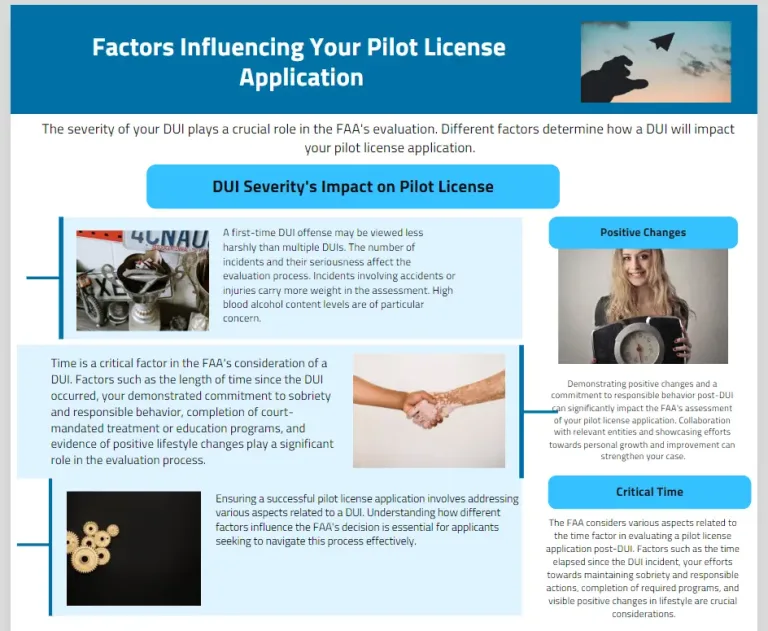Can You Get Pilot License with DUI? FAA Requirements
A DUI on your record doesn’t have to ground your dream of becoming a pilot. While it presents significant hurdles, there are potential paths forward for those determined to pursue a career in aviation. This comprehensive guide explores the complexities of obtaining a pilot license with a DUI and provides strategies for handling the process and helps you understand Can you get a pilot license with DUI.
Table of Contents
Understanding the Impact of a DUI on Pilot Licensing
The Federal Aviation Administration (FAA) takes alcohol-related offenses very seriously when evaluating pilot candidates. A DUI raises immediate concerns about an individual’s judgment and potential for substance abuse – qualities fundamentally incompatible with the responsibilities of piloting an aircraft.
The cornerstone of this evaluation is the FAA medical certificate, a mandatory component of pilot licensing. This comprehensive assessment goes beyond physical health, examining your decision-making abilities and history of substance use. A DUI on your record will inevitably complicate this process.
Factors Influencing Your Pilot License Application
The severity of your DUI plays a crucial role in the FAA’s evaluation:
1. A first-time offense may be viewed less harshly than multiple DUIs.
2. Incidents involving accidents or injuries carry more weight.
3. High blood alcohol content levels are particularly concerning.
Time is also a critical factor. The FAA considers:
– The length of time since your DUI occurred
– Your demonstrated commitment to sobriety and responsible behavior
– Completion of any court-mandated treatment or education programs
– Evidence of positive lifestyle changes

How to Handle the Path Forward?
While challenging, obtaining a pilot’s license with a DUI on your record is not impossible. Here are key steps to consider:
1. Consult an Aviation Medical Examiner (AME):
An AME is your most valuable resource in this process. They can assess your specific situation, advise on necessary steps to qualify for a medical certificate, and guide you through the FAA’s evaluation process.
2. Explore the Special Issuance Process:
Depending on the circumstances of your DUI and your subsequent actions, the FAA might grant a special issuance of the medical certificate. This involves a thorough review of your case, potentially additional medical evaluations, and ongoing monitoring.
Read also:
How many times can a dui case be postponed
3. Demonstrate Responsibility:
Focus on maintaining sobriety, completing any required programs, and making positive lifestyle changes. Document your progress and be prepared to provide evidence of your commitment to safety and responsible decision-making.
4. Be Transparent:
Full disclosure is crucial. Be honest about your DUI history throughout the application process. Attempting to hide this information will likely result in automatic disqualification.
5. Understand the Regulations:
Familiarize yourself with the Federal Aviation Regulations (FAR), particularly those relating to medical certification requirements, pilot conduct, and substance abuse policies in aviation.
Additional Considerations for Aspiring Pilots
While navigating the medical certification process, you can still take proactive steps towards your aviation career:
– Research flight schools and pilot training programs
– Begin ground school studies to build your knowledge base
– Network with aviation professionals for guidance and mentorship
– Explore different types of pilot licenses (private, commercial, airline transport)
Espouse Culture of Responsible Piloting
The aviation industry maintains a zero-tolerance policy towards substance abuse. As an aspiring pilot, it’s crucial to understand the physiological effects of alcohol on flying performance and commit to ongoing education about substance abuse prevention in aviation. Demonstrating a commitment to responsible decision-making is essential for your future career.
Look For Additional Resources
1. Utilize FAA publications and resources on pilot medical certification
2. Join pilot organizations offering support and information
3. Consider consulting with a lawyer specializing in aviation law for specific guidance on your DUI and pilot licensing aspirations
Conclusion
While a DUI presents significant challenges to becoming a pilot, it’s not an insurmountable obstacle. With dedication, transparency, and a commitment to responsible behavior, you can work towards achieving your aviation dreams. Remember to consult with professionals, stay informed about FAA regulations, and maintain a steadfast focus on safety throughout your journey.
Related Articles For You:
Colorado Lawyer Jailed for DUI at Own Sentencing Hearing
FAQs
Q: Can I get a pilot’s license with a DUI on my record?
A: A DUI doesn’t automatically disqualify you, but it creates significant challenges. The FAA considers the severity of the offense, time elapsed, and your demonstrated responsibility since the incident.
Q: What happens if I have a DUI during the pilot licensing process?
A: You must disclose the DUI to the FAA immediately. This will likely pause your application process and require additional evaluation. Consult an AME for guidance on how to proceed.
Q: How long after a DUI can I become a pilot?
A: There’s no set time frame. The FAA evaluates each case individually. Focus on maintaining sobriety, completing any required programs, and demonstrating responsible behavior.
Q: What are my chances of getting a medical certificate with a DUI?
A: Your chances depend on the specifics of your DUI, your actions since then, and your overall health. An AME consultation will provide a more accurate assessment of your individual case.
Q: Do I need a lawyer if I have a DUI and want to become a pilot?
A: While not mandatory, an aviation law attorney can offer valuable guidance on navigating the legal complexities of your situation, especially if you’re pursuing a special issuance medical certificate.
Disclaimer: This guide provides general information and does not constitute legal or medical advice. Always consult with an Aviation Medical Examiner and consider seeking legal counsel for personalized guidance regarding your specific situation and pilot licensing aspirations.
About the Author

Sarah Klein, JD, is a former criminal defense attorney with hands-on experience in cases involving DUIs, petty theft, assault, and false accusations. Through All About Lawyer, she now helps readers understand their legal rights, the criminal justice process, and how to protect themselves when facing charges.
Read more about Sarah
